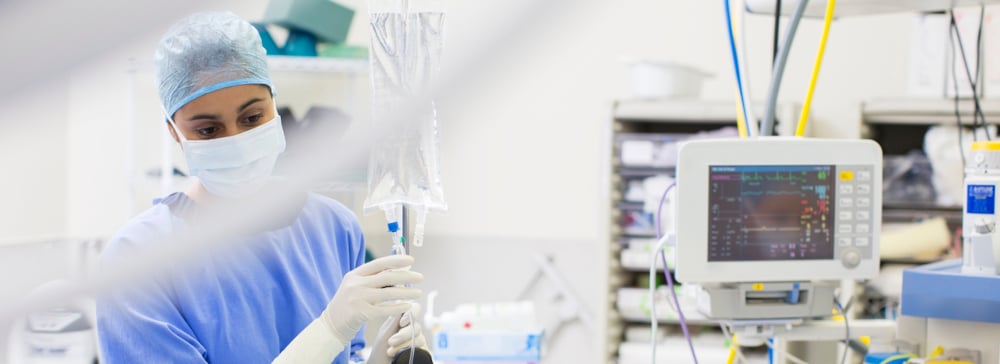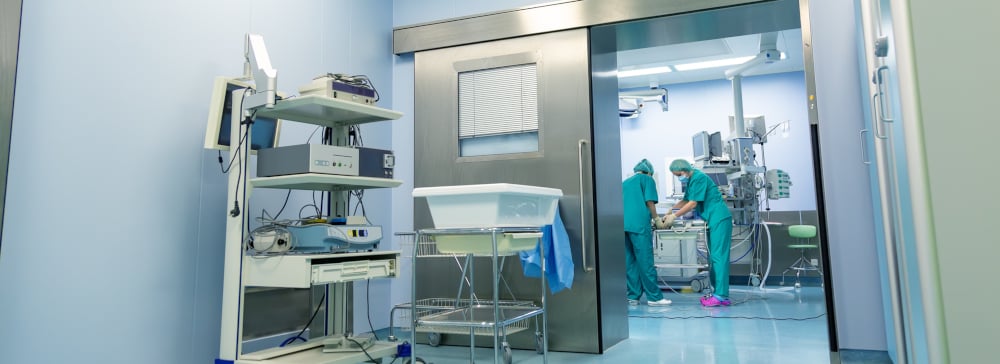Table of Contents
When a doctor or other health care provider leaves you injured instead of healed, the experience is devastating. At Kogan & DiSalvo, our medical malpractice attorneys in Vero Beach, Florida, understand the outrage and disillusionment you feel at this breach of trust.
We leverage decades of experience representing personal injury victims throughout South Florida. When you need a full-service law firm that takes cases on a contingency basis, you can depend on the team of Kogan & DiSalvo to get you the compensation you need to heal and rebuild your life. Contact us today for a free consultation

Patients depend on healthcare professionals and facilities to provide safe medical care to improve their health and wellness. Malpractice occurs when doctors and other licensed health practitioners fail to meet the prevailing standard of care and cause injury or wrongful death to a patient.
Some of the more common mistakes include leaving a medical instrument inside the body during surgery, misdiagnosis of the patient, or prescribing the wrong medication.
A medical error can make an existing health condition worse, or lead to a new, more serious medical problem. Medical malpractice claims are a way for patients to hold careless providers accountable. They also provide compensation for injured patients living with the aftermath of medical negligence.

According to a report from the American Medical Association, more than one-third of doctors have been sued for medical negligence at some point in their careers. But medical malpractice is not limited to just physicians.
All licensed healthcare providers in Florida are legally responsible for negligence under Florida’s medical malpractice statute. They include:

Florida has a legal rule called vicarious liability. This principle holds individuals and organizations responsible for actions committed by employees acting on their behalf. For example, when a surgeon commits malpractice during an operation, the hospital where the surgery occurs may have vicarious liability.
Examples of organizations and entities that can have vicarious liability include:
Vicarious liability is especially important because of the protection it offers injured patients. A single individual may not have the resources to provide compensation to those they have harmed, but the institution they work for probably does.
As your legal advocate we evaluate your case to determine if it makes sense to file a claim against an individual, their employer, or both.

Medical negligence is surprisingly common and takes many forms. Physicians and other providers, for example, operate on the wrong body part, fail to order necessary tests, and discharge patients too early from the hospital. Providers can also engage in medical negligence through inattention at critical moments. Examples include an anesthesiologist failing to properly monitor a patient under sedation or an obstetrician who doesn’t heed signs of fetal distress during labor.
Medical negligence can happen at any point in the patient-physician relationship. For example, a doctor might fail to consider the patient’s complete medical history and overlook the symptoms of a pre-existing illness. When a physician doesn’t have the necessary expertise, he must refer the patient to a specialist. Failure to do so can be the basis of a malpractice claim for an improper referral.
Medical injuries can result from inaction, such as ending treatment too soon. For example, a physician discharges a hospitalized patient, and medical complications occur after discharge. This is the basis for a malpractice claim of delayed treatment (sometimes called delayed diagnosis).
Common types of malpractice include:

Common types of medical malpractice lawsuits include:
Proper treatment depends on the right diagnosis. A wrong diagnosis, delayed diagnosis, or missed diagnosis that leads to health complications may be medical malpractice.
Keep in mind, even the most competent providers misdiagnose patients, and many conditions are diagnosed through exclusion (ruling out other conditions.) The patient (plaintiff) must show that a provider in the same specialty would have correctly diagnosed their condition based on the information available.
Elective and necessary treatments and procedures have risks. Medications do as well. Providers have a duty to disclose these risks to their patients so they can make informed decisions about their own health. If they don’t, and the patient has an adverse outcome, that patient may have a case for malpractice.
Surgical errors are unintentional and avoidable injuries that could have been prevented if the providers involved followed proper protocols. These mistakes include operating on the wrong body part, leaving surgical items in the patient, and even performing the wrong procedure altogether.
When a patient is harmed because they were prescribed the wrong medication or dosage, or suffered complications while under anesthesia, any medical professional involved in the process may be liable for malpractice. Depending on when and how the error occurred, the pharmacist, nurse, physician, surgeon, or aesthetician may be liable for malpractice.
Improper course of treatment occurs when a provider recommends care that falls below the accepted standard of care. If the treatment plan is appropriate, but the patient chooses not to follow it and they are harmed, that patient probably cannot sue for malpractice.
The “medical standard of care” is the barometer used to assess the actions of healthcare providers and medical facilities in medical malpractice cases.
The standard of care is the proper and best course of treatment for a certain illness, injury, or condition. Florida Stat. § 766.102(1) (2018) defines this as the, “ level of care, skill, and treatment which, in light of all relevant surrounding circumstances, is recognized as acceptable and appropriate by reasonably prudent similar health care providers.”
Medical malpractice is a deviation from this prevailing standard of care which other providers with the same training and experience would provide in a comparable situation.

We put incredible trust in our doctors, surgeons, and other providers. When we enter a hospital, we assume we are safe. These are people and institutions licensed and regulated by the state. Yet, we put our lives in their hands. When that trust is betrayed by negligence, it can be life-changing.
After medical negligence, it’s common to experience physical and mental suffering and monetary losses. You may be unable to work and incur additional medical costs to treat the injury caused by the medical malpractice.
Preventable injuries can also affect your relationships, your ability to care for your loved ones, and your overall quality of life.

A medical malpractice liability claim is a type of personal injury that allows injured individuals to sue a healthcare worker or facility for harm they experienced from a medical mistake. The key to medical malpractice cases is investigation. When we take your case, an experienced Vero Beach personal injury lawyer immediately begins gathering evidence.
Our decades of medical malpractice experience and familiarity with the Vero Beach and Indian River County community gives us an advantage. We’ve sued many of the same hospitals and organizations before and know their tactics. We’ve also dealt with the insurers and their attorneys.
We can demand to see medical records relating to your injury and take pre-trial testimony from everyone involved in your care. We’ll learn what led to the malpractice and whether anyone tried to cover it up. In addition, we can retain a medical expert who will review the records and advise on what your providers missed or got wrong.
Finally, there is no limit on the damages you can recover in Florida for medical negligence for your monetary losses and pain and suffering. An earlier law limiting damages was overturned in 2022 by the Florida Supreme Court.
To win a medical malpractice claim in Florida, the plaintiff must prove three key elements:
When a medical malpractice claim is successful, the plaintiff is awarded compensation for economic losses like medical bills, lost wages, long-term care, and disability.
Compensation for non-financial losses like physical pain, mental anguish, and the loss of enjoyment of life is also possible.
Your Vero Beach personal injury lawyer will calculate how much you can potentially receive after reviewing the facts of your case.

Generally, the statute of limitations to sue for medical malpractice in Vero Beach and throughout Florida is two years from the time of the injury. Therefore, the surest way to preserve your claim is to consult a medical negligence attorney without delay to ensure your case is filed on time.
When you are injured or lose a loved one, South Florida medical malpractice lawyers with Kogan & DiSalvo will represent you with compassion, commitment, and tenacity. Our goal is to obtain the maximum damages award to help you move forward. Contact us today for a free case evaluation. We work on a contingency fee basis, so there are no upfront legal costs.
If you are injured and unable to come to us,
our attorney will come to you - there is no charge for us to do so.